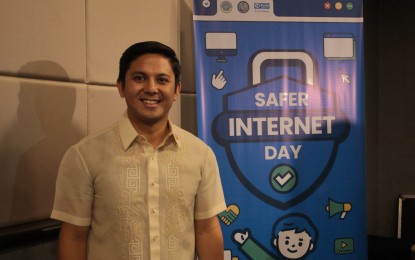MANILA — The government is exploring new approaches to combat online sexual abuse and exploitation of children (OSAEC).
During a briefing for Safe Internet Day 2024, Department of Justice (DOJ) Assistant Secretary Mico Clavano stated that among the measures under consideration is collaboration with money service businesses (MSBs) to flag transactions used for subscribing to or purchasing illicit content involving minors.
Social Welfare and Development Undersecretary Emmelin Villar mentioned close coordination with social media platforms to implement AI-driven systems that restrict access to harmful websites and content.
Officials noted that platforms such as Meta and TikTok are participating in ongoing discussions to eliminate such material.
Clavano emphasized the need for adjustments, as anti-money laundering thresholds are significantly higher than the small sums typically involved in OSAEC-related transactions, which can be as low as PHP50 per photo.
Research indicates that consumers of such content are predominantly men from the U.S., Europe, and Australia.
«There are platforms where CSAEM (child sexual abuse or exploitation material) subscriptions cost as little as PHP300 for videos. On Telegram, it can go down to PHP50,» Clavano said.
He also confirmed ongoing negotiations with remittance and e-wallet platforms.
«We are already in consultations with money service businesses not yet covered by anti-money laundering laws,» he added.
Justice Secretary Jesus Crispin Remulla declared the government’s full-scale war against online predators.
Remulla acknowledged the National Coordination Center Against Online Sexual Abuse or Exploitation of Children and Child Sexual Abuse or Exploitation Materials (NCC-OSAEC-CSAEM) and other partners for successfully organizing this year’s Safe Internet Day.
«Your dedication to this noble cause deserves the highest appreciation,» Remulla stated.
He reaffirmed the department’s commitment to pursuing cyber predators and safeguarding Filipinos in the digital space.
«We are watching your every move,» he warned.
Proclamation 417, signed in 2018, designates the second Tuesday of February as Safe Internet Day for Filipino Children—a reminder for collective action to protect minors from abuse and exploitation while fostering a safer cyberspace.
The NCC-OSAEC-CSAEM operates under the Inter-Agency Council Against Trafficking, chaired by Remulla, with Justice Undersecretary Nicholas Felix Tay as vice chair.
DOJ
«DOJ» most commonly refers to the **U.S. Department of Justice**, the federal executive department responsible for enforcing federal laws, ensuring public safety, and administering justice in the United States. Established in 1870 during President Ulysses S. Grant’s administration, it oversees agencies like the FBI, DEA, and ATF, and plays a key role in legal and law enforcement matters.
If you meant a different «DOJ» (e.g., a cultural site or abbreviation in another context), please provide additional details for a more accurate summary.
Meta
«Meta» can refer to Meta, Colombia, a department known for its diverse landscapes, including parts of the Andes and the Amazon rainforest. Historically, it was inhabited by indigenous groups before Spanish colonization and later became a key region for agriculture and cattle ranching. Alternatively, «Meta» may refer to Meta Platforms, Inc. (formerly Facebook), a tech company founded in 2004, which rebranded in 2021 to focus on the metaverse and virtual reality.
If you meant a different «Meta,» please provide more context!
TikTok
TikTok is a popular social media platform launched in 2016 by the Chinese company ByteDance, known for its short-form video content. It evolved from the earlier app Douyin (released in China in 2016) and gained global prominence after merging with Musical.ly in 2018. Today, TikTok is a cultural phenomenon, influencing music, trends, and digital communication worldwide.
Telegram
Telegram is a cloud-based instant messaging service founded in 2013 by brothers Pavel and Nikolai Durov as a secure and privacy-focused alternative to other messaging apps. Known for its end-to-end encryption, self-destructing messages, and open API, Telegram gained popularity for its emphasis on speed and security, particularly among users seeking censorship-resistant communication. It has also been used for large-scale public channels and group chats, playing a role in activism and news dissemination in restricted regions.
National Coordination Center Against Online Sexual Abuse or Exploitation of Children and Child Sexual Abuse or Exploitation Materials
The **National Coordination Center Against Online Sexual Abuse or Exploitation of Children and Child Sexual Abuse or Exploitation Materials** is a specialized agency dedicated to combating the online exploitation of children. It works to investigate, prevent, and prosecute crimes involving child sexual abuse materials (CSAM) by coordinating efforts between law enforcement, tech companies, and international partners. Such centers have emerged globally in response to the rise of digital crimes against children, aiming to protect victims and hold offenders accountable.
NCC-OSAEC-CSAEM
The acronym **NCC-OSAEC-CSAEM** refers to the **National Coordination Committee of the One Stop Service Centre for Eliminating Child Labour (OSAEC) and the Child Sexual Abuse Eradication Movement (CSAEM)** in Cambodia. This initiative aims to combat child labor and sexual abuse through coordinated efforts, providing support services like education, legal aid, and rehabilitation. Established with government and NGO collaboration, it reflects Cambodia’s commitment to child protection and human rights.
Inter-Agency Council Against Trafficking
The **Inter-Agency Council Against Trafficking (IACAT)** is a Philippine government body established in 2003 under the **Anti-Trafficking in Persons Act (RA 9208)** to combat human trafficking through prevention, protection, and prosecution efforts. Composed of multiple government agencies, NGOs, and international partners, it coordinates policies, rescues victims, and prosecutes offenders. The council plays a key role in the Philippines’ efforts to address trafficking, both domestically and across borders.
Proclamation 417
Proclamation 417 refers to a declaration issued by U.S. President Gerald Ford on September 14, 1974, which granted a conditional pardon to Vietnam War draft evaders and military deserters. The proclamation aimed to promote national reconciliation by allowing those who avoided service to reintegrate into society, provided they pledged allegiance and fulfilled alternative service requirements. It was a significant step in healing divisions caused by the Vietnam War.






